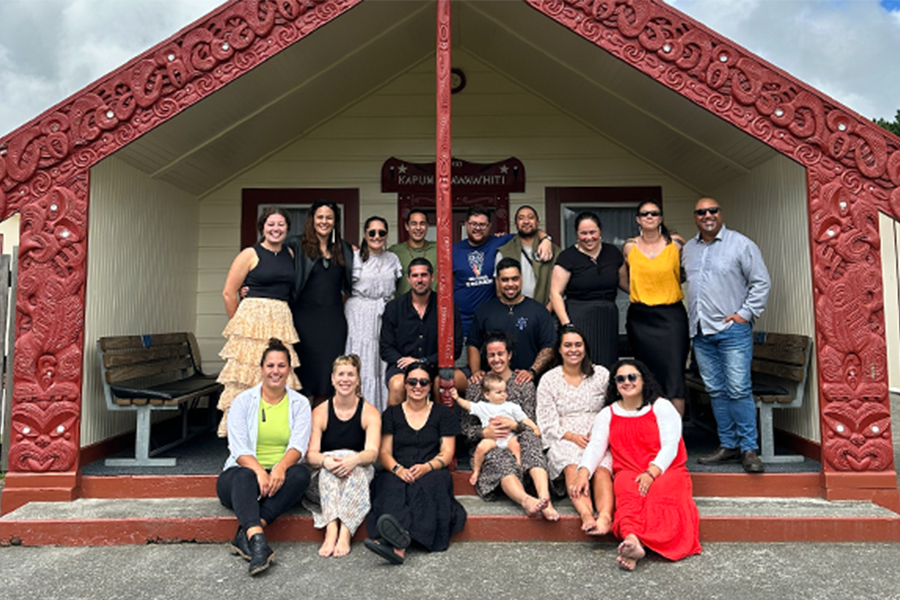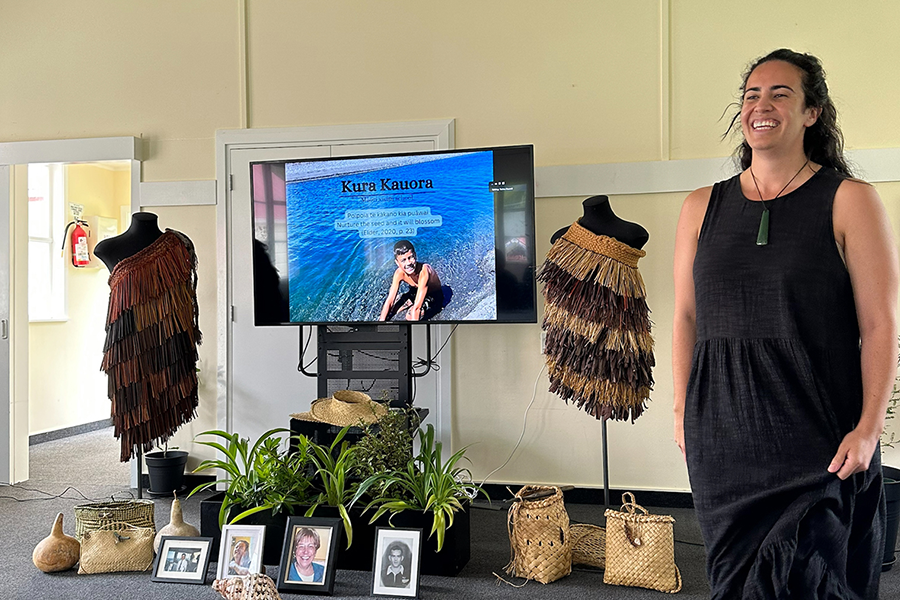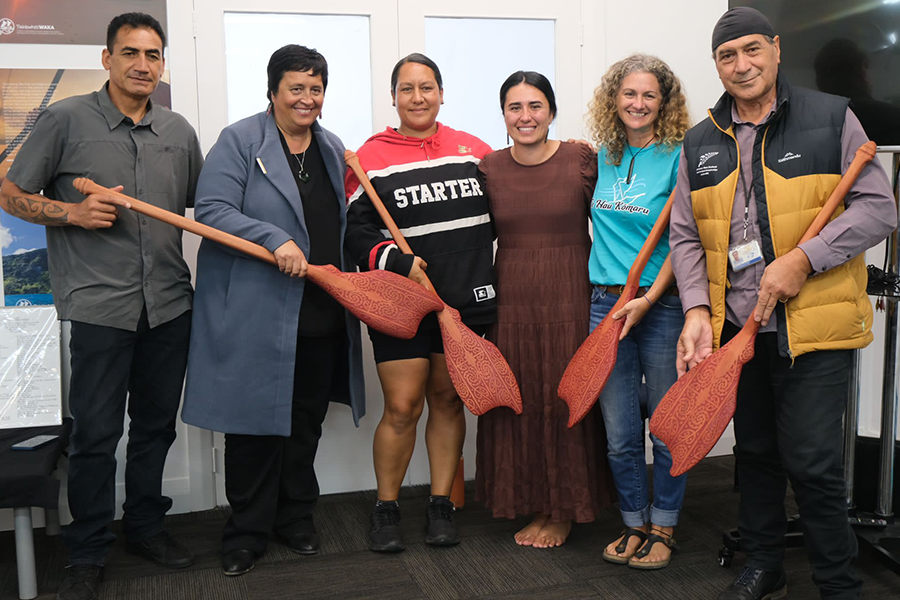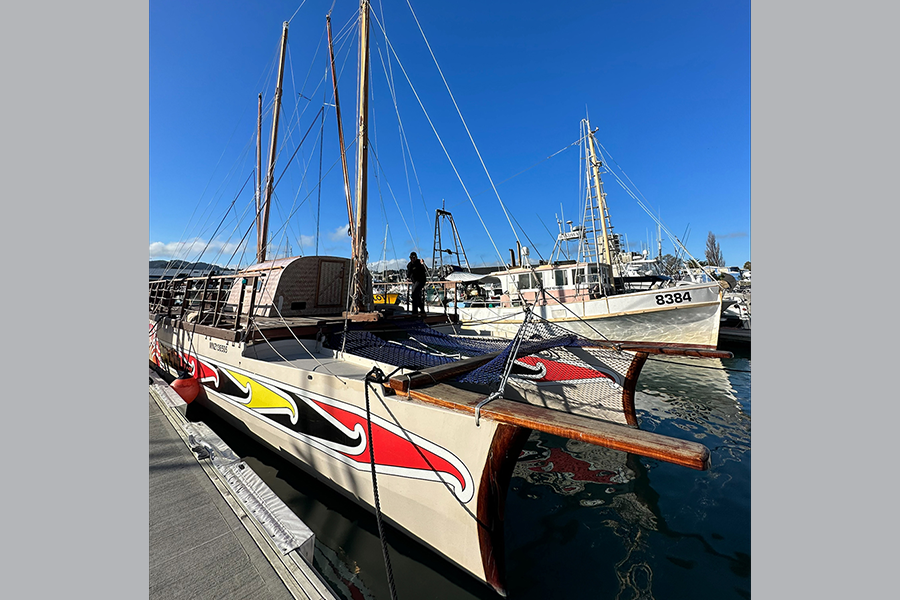
Te Koronga whānau gather at Te Pou-o-Tainui Marae in Ōtaki for Terina’s PhD oral defence.
Having supported each other through their studies, Terina Raureti (Ngāti Raukawa, Ngāti Rangitihi) and Ngahuia Mita (Te Aitanga-a-Māhaki, Ngāti Porou, Ngāti Hako, Hauraki) are now the first Otago students to have completed their PhD oral defences in their own communities in Te Ika a Māui.
Within the kaupapa of Te Koronga in the Centre of Indigenous Science, both returned to Dunedin with their whānau recently to formally graduate with their Doctorates.
Graduation was a special moment for their journey together as their paths have been intertwined since childhood when at about the age of 10 Terina moved with her whānau to Ngahuia’s home of Te Tairāwhiti.
Some years after their first meeting, they once again came together at Otago through their studies and engagement with the kaupapa Māori research and teaching excellence rōpū Te Koronga.
Both Terina and Ngahuia credit Professor Anne-Marie Jackson, and others who came before, for elevating the important focus of mahi and research to support the goal of hauora and flourishing wellness for communities.
“We were the fortunate recipients of the strong relationships Anne-Marie had developed with Kāti Huirapa ki Puketeraki at Karitāne which we were introduced to as third-year Te Koronga students,” Ngahuia says. “We were given the opportunity to grow in this research space with a focus on community through our Karitāne whānau which was so nurturing.”
Terina adds the Karitāne whānau have been like a kōhanga for their whole university life. “We were all welcomed and supported through all the kaupapa going on and have retained a strong connection with that community ever since.”
Ngahuia completed her masters research alongside members of the Hauteruruku ki Puketeraki, a waka club based in Kāti Huirapa ki Puketeraki, exploring the role of waka for learning and engagement with Te Ao Takaroa. Terina also undertook two internships with Karitāne whānau based on Waikouaiti awa, and connection to whakapapa through Hauteruruku waka.
So, after Terina and Ngahuia had completed their respective Masters’ degrees and were making decisions around the research focus and thesis of their own Doctorates, this grounding in Kaupapa Māori led them to embark on their PhD’s within their own communities.
As Ngahuia says, “it’s been awesome to be able to come back home and serve our own communities and their aspirations using the skills, knowledge, and understanding that we have picked up through Te Koronga and Karitāne whānau and have added to the kete.”

Terina prepping for her defence amongst her whānau ā-wairua and whānau taonga in the wharepiri of Te Pou-o-Tainui Marae.
Terina Raureti (Ngāti Raukawa, Ngāti Rangitihi)
Building on her postgraduate studies on Māori water safety, Terina decided that for her PhD “to be authentic to who I am and of benefit to my community, I needed to be at home doing it with my own whānau, in our own river and waterway”.
The mahi was undertaken with her whānau of Ngāti Kapu in Ōtaki, and the Karitāne whānau, where she developed a model, Kauora, for understanding swimming from a whānau Māori perspective.
“The aims of this research were to understand how whānau practice and perceive swimming and its contribution to whānau health and well-being, and to create a swimming initiative that satisfies the needs of our whānau and wider iwi Māori,” Terina explains. The overarching vision of reengaging with swimming from a whānau lens is ultimately to help strengthen connection to wai to flourish hauora, and help to reduce drowning statistics.
Terina says that her biggest fear for undertaking a PhD, and which almost put her off even starting a Doctorate, was the oral defence and examination at the end of the process. When the time finally came, her whānau welcomed the oral defence taking place within her marae of Te Pou-o-Tainui in Ngāti Raukawa.
Around 100 members of the community attended throughout the day, including Professor Meihana Durie as an examiner in-person, and the two international examiners joined remotely by Zoom.
Terina describes that in addition to the questions asked by the examiners, whānau were also invited to ask their own questions or often added to what she’d said.
“In many ways it was really hard in front of the community as they are the ones who can hold me to account and say I’m wrong,” Terina says. “But it ended up as such a community celebration and I wouldn’t want to have done it any other way.”
Te Kura-ā-iwi o Whakatupuranga Rua Mano, the kura that Terina attended in Ōtaki for her primary school years, also participated in the oral defence where they welcomed the University of Otago staff, prepared kai, did haka, waiata, and helped with clean up.
Now by applying the outcomes of her PhD research, Terina is giving back to that kura as a postdoctoral research fellow with Coastal People: Southern Skies.
“I’m currently finalising all the pūkenga (competencies) that were developed through my thesis into a programme that can in time be run by the kura themselves. It’s exciting, as it’s bringing it all to life.”

Ngahuia (third from right) with five of the kaikōrero (speakers/knowledge sharers) of her research. The hoe (paddles) by artists Eruera Brown and Paora Peipi were presented as koha.
Ngahuia Mita (Te Aitanga-a-Māhaki, Ngāti Porou, Ngāti Hako, Hauraki)
Ngahuia (third from right) with five of the kaikōrero (speakers/knowledge sharers) of her research. The hoe (paddles) by artists Eruera Brown and Paora Peipi were presented as koha.
Ngahuia’s PhD thesis in her community of Te Tairāwhiti built on the foundations of her waka mahi at Karitāne and explored waka voyaging philosophies.
Her work centred on Tairāwhiti Waka, a 72ft waka hourua (double-hulled sailing canoe) that enables rangatahi to learn and embody Tairāwhiti Voyaging Philosophies which act as principles of behaviour, ultimately supporting how waka hourua can positively enhance identity and improve hauora.
“Through working with a specific cohort of rangatahi who really enjoyed engaging with the waka and learning about their tupuna, I saw the really positive outcomes of the waka for the community and specifically the uniqueness of our community which was an intentional part of the research,” Ngahuia says.
“Rangatahi have so much insight into this space, so why would we talk about what’s good for them if we don’t engage and support them in their aspirations and allow them to shine in who they are.”
For Ngahuia’s oral defence, she welcomed the examiners, manuhiri and whānau onto Tairāwhiti Waka for a mihi whakatau, for purposes she describes as “placing the context where it needed to be”.
The examination was undertaken at the Tauawhi Men’s Centre run by her Dad which Ngahuia says was a great opportunity to acknowledge and share that part of the PhD process with the community who had contributed so much to it.
“The community are the why and the how of what we do. What we are doing is carrying on the kaupapa and aspirations from those who have come before us. We are the current people doing the mahi right now in this space, and there will be others who follow after us.”
Now a Research Fellow with Te Koronga in the Centre of Indigenous Science, Ngahuia continues to contribute to the hauora of her community working on a project with a local iwi health provider Turanga Health, in conjunction with Va’a o Tautai, Otago’s Centre for Pacific Health.
Ngahuia says she’s very fortunate to have grown up and been able to return to complete her Doctorate in her community of Te Tairāwhiti.
“We live in and connect to a unique part of the world home to limitless potential and innovation and in splendid isolation which comes with its own challenges.
“Being able to complete my research here at home and on our waka has given me a firm grounding as a Kaupapa Waka researcher which now guides me in my current work as a research fellow.”

At the centre of Ngahuia’s PhD research and based in Turanganui a Kiwa Gisborne, Tairāwhiti Waka hourua.
Acknowledgements
Terina and Ngahuia would like to acknowledge the support of their Doctorate supervisors, Professor Anne-Marie Jackson, Dr Chanel Phillips, Professor Chris Button, and Dr Hauiti Hakopa.
“We brought these mokopuna home,” Professor Anne-Marie Jackson says.
“Within kaupapa Māori, it was a natural, and normal aspiration for us to whakamana these tauira, who worked on kaupapa of their own whānau, hapū and iwi. Our mātauranga exists and continues to flourish within these spaces, and this was another part of the shared aspirations of flourishing wellness.”
Also a supervisor for both Terina’s and Ngahuia’s Doctorate studies, Dr Chanel Phillips (Ngāti Hine, Ngāpuhi) says she’s had the immense privilege of watching both Terina and Ngahuia journey through their undergraduate and postgraduate studies.
“First as a friend and peer a few years ahead of them, then as a tuakana within Te Koronga, to more recently being one of their supervisors. To see them both standing on their tūrangawaewae, alongside their whānau, hapū and iwi, defending their PhD theses was such a special and beautiful thing to witness,” Dr Phillips says.
“It is both exciting and encouraging the legacy these two amazing wāhine have left behind for their teina and future students to follow. To have the courage to go home, to work alongside your whānau and your communities, and then to defend that work and research alongside them in their home.
“Terina and Ngahuia have paved the way for those who follow behind them, and it’s exciting to think what will come next for them both, and our future tauira.”
Kōrero by Guy Frederick, Sciences Communications Adviser